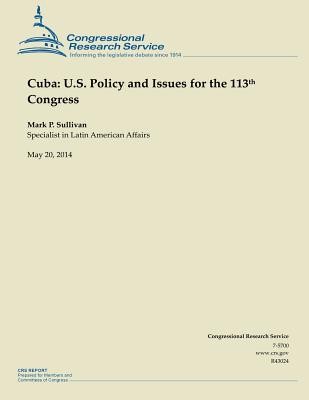
- We will send in 10–14 business days.
- Author: Mark P Sullivan
- Publisher: CreateSpace Independent Publishing Platform
- ISBN-10: 1502998920
- ISBN-13: 9781502998927
- Format: 21.6 x 28 x 0.4 cm, softcover
- Language: English
- SAVE -10% with code: EXTRA
Reviews
Description
Cuba remains a one-party communist state with a poor record on human rights. The country's political succession in 2006 from the long-ruling Fidel Castro to his brother Raúl was characterized by a remarkable degree of stability. In February 2013, Castro was reappointed to a second five-year term as president (until 2018, when he would be 86 years old), and selected 52- year old former Education Minister Miguel DÃaz-Canel as his First Vice President, making him the official successor in the event that Castro cannot serve out his term. Raúl Castro has implemented a number of gradual economic policy changes over the past several years, including an expansion of self-employment. A party congress held in April 2011 laid out numerous economic goals that, if implemented, could significantly alter Cuba's state-dominated economic model. Few observers, however, expect the government to ease its tight control over the political system. While the government reduced the number of political prisoners in 2010-2011, the number increased in 2012; moreover, short-term detentions and harassment have increased significantly over the past several years.
EXTRA 10 % discount with code: EXTRA
The promotion ends in 17d.11:46:14
The discount code is valid when purchasing from 10 €. Discounts do not stack.
- Author: Mark P Sullivan
- Publisher: CreateSpace Independent Publishing Platform
- ISBN-10: 1502998920
- ISBN-13: 9781502998927
- Format: 21.6 x 28 x 0.4 cm, softcover
- Language: English English
Cuba remains a one-party communist state with a poor record on human rights. The country's political succession in 2006 from the long-ruling Fidel Castro to his brother Raúl was characterized by a remarkable degree of stability. In February 2013, Castro was reappointed to a second five-year term as president (until 2018, when he would be 86 years old), and selected 52- year old former Education Minister Miguel DÃaz-Canel as his First Vice President, making him the official successor in the event that Castro cannot serve out his term. Raúl Castro has implemented a number of gradual economic policy changes over the past several years, including an expansion of self-employment. A party congress held in April 2011 laid out numerous economic goals that, if implemented, could significantly alter Cuba's state-dominated economic model. Few observers, however, expect the government to ease its tight control over the political system. While the government reduced the number of political prisoners in 2010-2011, the number increased in 2012; moreover, short-term detentions and harassment have increased significantly over the past several years.


Reviews